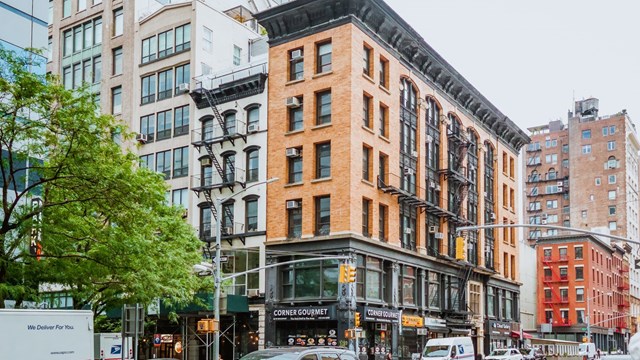
Admission requirements for co-op buildings in New York City are typically pretty stringent. A board has the authority to require prospective purchasers to provide extensive financial documentation along with social and personal reference letters, to interview with the board and/or an admissions committee of the board, and in many cases, to undergo criminal and financial background checks.
Historically, the rules for buying condos were much more lax than they are for co-ops, but in recent years, that has been changing. Some Manhattan buildings—such as the Trump buildings, and some newer ones on Fifth Avenue and the Upper West Side, according to brokers and attorneys questioned on this issue—now require more extensive financial documentation, social references and some, even interviews for prospective buyers. And on the opposite end of the spectrum, brokers envision that you also may see some co-ops loosening their requirements in an effort to attract buyers.
In the case of some of the condos he has represented, Stuart M. Saft, an attorney with the Manhattan law firm of Wolf Haldenstein Adler Freeman & Herz LLP, says the board in their bylaws will state that they don't have to exercise their right of first refusal until 20 days after they've been supplied with the specific documentation they require.
The Right of First Refusal
In New York, the sale of a condominium is conditional upon the Board of Managers waiver of the right of first refusal approving the purchaser, unless you are purchasing directly from a developer. In certain condominium declarations, this right of first refusal provision gives existing owners of other units in the complex (or the board of managers) the right to purchase a condominium for the same price, and under the same terms, as a party whose offer-to-purchase has been accepted by the seller.
"They've become very concerned about quality of life issues—people making too much noise or becoming disruptive. It's already in the governing documents. It's standard in everybody's condominium bylaws," Saft says.
Saft notes that he represented a board about two years ago, that had an application from an individual who had a number of felony assault convictions. "And the board during this period got the bylaws amended to allow them to reject anybody with felony assault convictions."
According to Saft, the state Condominium Act does allow boards to reject someone if there are provisions in the building's bylaws to that effect. "It's just a question of whether the unit owners want to give the board that kind of control," says Saft.
"I do see the boards becoming far more strict in terms of wanting to and being concerned about who's moving into the building," he explains.
And the admissions process is seemingly getting more prolonged. The board could, and oftentimes does delay, giving the waiver of the right of first refusal to the prospective buyer until the board receives all of the information it has asked for, says Saft.
And Adam Leitman Bailey, a Manhattan-based co-op and condo attorney, says that condo boards are using that waiver as leverage to get the information they are looking for in a potential purchaser. Dragging out the process even to the point of some buyers taking legal action is not out of the ordinary, he says.
Condo boards these days are definitely asking for more documentation, including financial statements, business and personal references, and the like, according to Jane Bayard, an executive vice president with Warburg Realty Partnership. "I've never heard of an interview but it's perfectly possible that that's required," she says. "But it does vary from building to building. There's no standard."
"It's definitely more rigorous than it used to be," says Bayard, speaking about the 22 percent of the city's more than 462,000 housing units in the co-op and condo inventory that are condominium-based. "You used to be able to just submit an asset and liability form with no backup, and now they're requiring the backup. And more detailed letters and everything. It will never be as bad as a co-op but it's not as good as it used to be," she laughed.
Lawrence Lee, a project manager with the Bracha Group at Prudential Douglas Elliman, says that eight forms of documentation are required at the Trump condo projects he has worked on. Upon the contract signing, Lee's job is to facilitate the buyer's board package process by answering any questions, providing sample reference letters, organizing the package, and presenting it to the board of management. Three items showing financial worthiness, four personal reference letters and one business reference letter is typical, he says.
Still Less Intrusive
But that still doesn't mean that a carte blanche refusal by condominium boards is commonplace. It is still unusual for condo boards to ask for interviews or social references and boards hardly ever exercise the right of first refusal of the unit to thwart a sale. "The condo board has no say on who can purchase a condo," says Philip Eisenberg, a board member of Greenhouse Condos in Cliffside Park, New Jersey. "If someone has the money to purchase the property, he can do so without the board stopping him."
Although condos do not have the same right as co-ops to delve into a prospective buyer's personal and financial background, some condo bylaws require the seller to provide some information about the buyer to the board. That's a relatively rare occurrence, however, because few boards seek that extreme level of compliance.
The bottom line, though, is that condo boards today are seeking more control, even if they don't get it—as to who they allow to live in their developments. While their requirements may never meet the complexity of the co-op application process, the trend seems to be a push towards tougher guidelines for all prospective purchasers.
Debra A. Estock is managing editor of The Cooperator.






Leave a Comment